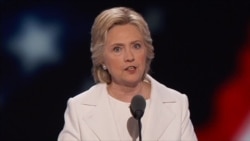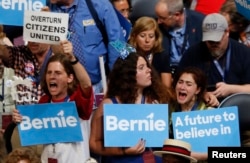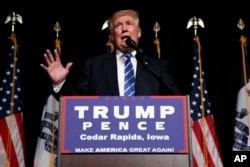Hillary Clinton accepted the Democratic Party's nomination for president Thursday night with a message stressing the need to unite in order to confront the nation's challenges.
"It truly is up to us. We have to decide whether we will all work together so we can all rise together," Clinton said in an address on the final night of the Democratic National Convention in Philadelphia.
The 68-year-old Clinton is the first woman ever nominated for president by a major U.S. political party. She won the nomination after defeating her principal rival, Vermont Senator Bernie Sanders, in the state-by-state process of primary and caucus votes.
Appeal to Sanders supporters
Despite Sanders giving his endorsement in his own speech at the convention this week, one of her challenges ahead of the November election is to appeal to the group of his supporters who say they will not support her. She praised Sanders for his campaign on Thursday, highlighting its appeal to young people and efforts to promote economic and social justice.
"I want you to know I've heard you," Clinton said. "Your cause is our cause."
She pledged to work to create more jobs with higher wages, saying the country does well when the middle class thrives.Clinton also said she has no interest in taking away people's guns, but wants to enact reforms to prevent people from being shot by those who should not have access to them.
"We have to heal the divides in our country, not just on guns, but on race, immigration and more," she said." And that starts with listening, listening to each other, trying as best we can to walk in each other’s shoes.”
Negative perceptions
Clinton's principal challenger in the general election is Republican nominee Donald Trump. Both candidates suffer from negative perceptions among voters, as revealed by multiple polls during the past year. Those same polls show about 30 percent of voters view Clinton as trustworthy, even as one from Gallup showed her as the country's most admired woman.
One source of that distrust is her use of a private email system during her time as secretary state, which was the subject of a congressional investigation and a probe by the Federal Bureau of Investigation. The FBI concluded Clinton's actions were "extremely careless," but did not warrant criminal charges.
Kyle Kondik of the University of Virginia Center for Politics said the issue is a lingering question for voters and one she might have been wise to mention in her speech Thursday.
"I did not hear any kind of contrition or acknowledgment of the questions about her email server," Kondik told VOA. "I personally thought that it would have been a worthwhile thing to sort of make at least an oblique acknowledgment of that issue. Obviously she and her advisors decided not to do that."
'Bigotry and bombast'
Clinton said Thursday that Trump wants Americans to fear the future and each other, and she took aim at some of the proposals he has put forth during his campaign, including building a wall at the U.S.-Mexico border and banning Muslims from entering the country.
“We will not build a wall. Instead, we will build an economy where everyone who wants a good job can get one," she said." And we’ll build a path to citizenship for millions of immigrants who are already contributing to our economy. We will not ban a religion, we will work with all Americans and our allies to fight and defeat terrorism.”
She further criticized what she called "the bigotry and the bombast" of the Trump campaign and cast his temperament has unfit for the presidency.
"A man you can bait with a tweet is not a man we can trust with nuclear weapons," Clinton said.
Throughout the campaign, Trump has portrayed himself as the candidate best able to deal with national security threats and who will put the interests of Americans first when it comes to the economy and international affairs.
After Clinton's speech, Trump posted a flurry of Twitter messages, including saying she was unfit to be president because of what he called her "refusal to mention Radical Islam" as she advocates allowing more refugees into the United States.
"No one has worse judgement than Hillary Clinton - corruption and devastation follows her wherever she goes," he said in another tweet.
DNC VIPs
The convention in Philadelphia brought together the biggest names in the Democratic Party to put forth why they think Americans can trust Clinton and why they believe she is the superior choice to lead the country when President Barack Obama's term ends in January.
Obama said Wednesday no man or woman has ever been more qualified for the position.
Vice President Joe Biden said of Trump that no major party nominee has been less prepared to handle the country's national security.
Clinton's running mate, Virginia Senator Tim Kaine, called Trump a "self-promoting, one-man wrecking crew."
'Too rosy picture'
Trump and his campaign have described the Democratic convention speakers as painting too rosy a picture of the state of the nation.
"I've been watching these speeches at night, and boy am I getting hit," Trump said at an event Thursday in Iowa. "I am getting hit and they don't mean it and there's a lot of lies being told."
Voters will make their choice on November 8, and the new president will take office on January 20.
Kondik said the presidential campaign could go into a lull in the month of August following the months of primary votes and this month's conventions.
"The conventions were early this year, you've got the Olympics coming in August," Kondik said. "It's just kind of a month where there's not a whole lot of news typically. So maybe we've got kind of a high point of the campaign now and then it will taper off just a bit between now and Labor Day and then get going again."
Kondik also said the majority of voters have already made up their minds, and that the conventions help solidify those choices.
"That's not to say things can't change between the end of the convention bounce and election day," he said. "There aren't a whole lot of persuadable people out there still. But there are also a higher number of undecided voters than there usually are, so we'll just have to see how it shakes out."
Elizabeth Cherneff contributed to this story.








